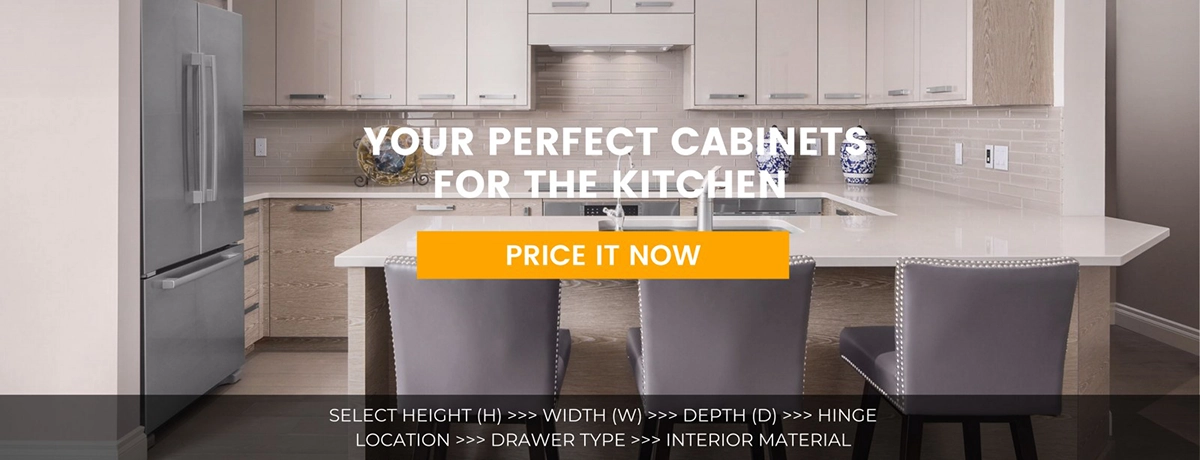Matching cabinets - do kitchen cabinets should match exactly?
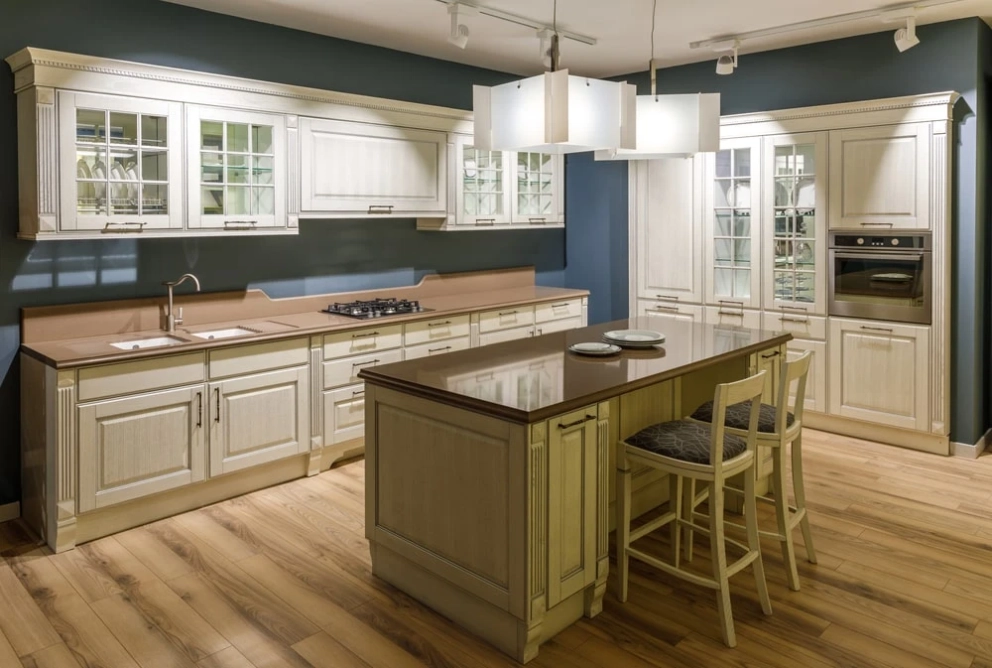
When you order a set of cabinets from a manufacturer, they will be perfect. The designer will definitely think through all the details, every shelf and edge. So you’ll have no deal with a single tiny imperfection of colour or size. Your kitchen cabinets match perfectly. But what if you’re choosing to get modules? It can be a few upper and base cabinets purchased from one seller. Then you will like a corner pantry at another store and a freestanding buffet from a garage sale. They wouldn’t match at all.
So is it required for kitchen cupboards to match exactly? It’s actually no! Creating a kitchen design by mixing different cupboards is a bit more difficult than choosing the entire colour and style of the kitchen set. It requires a lot of imagination, measuring and planning but instead, you can get a truly unique style. The vintage hutch can be perfectly adapted for a microwave. By mixing and matching different cabinets you can break the solid wall of cabinets, add depth and interest and attract attention with glass inserts. The easiest part here is to achieve colour matching in cabinets - you can just repaint them to look cohesive.
But even a uniform colour, in fact, is not required in a modern eclectic kitchen. Think back to all those trends for two-tone kitchens or a different coloured island - and take it one step further. What can stop you from choosing one central cabinet and making it different in colour or door style in your very own kitchen? Of course, matching kitchen cabinets in sole style is more advisable since it provides you with cohesiveness and ties the space together. But even experimenting with different types of finish, pulls and knobs or combinations of flush or raised panel doors can bring you benefits.
In this Cut2Size blog, we want to share our vision of how to match different kitchen cabinets. After reading our blog you will be able to combine a kitchen from any available units and enjoy it. Continue reading and you will find out why it is important to be capable of different appliance types matching, and adding various details like countertops, faucets and hardware.
How to find matching kitchen cabinets
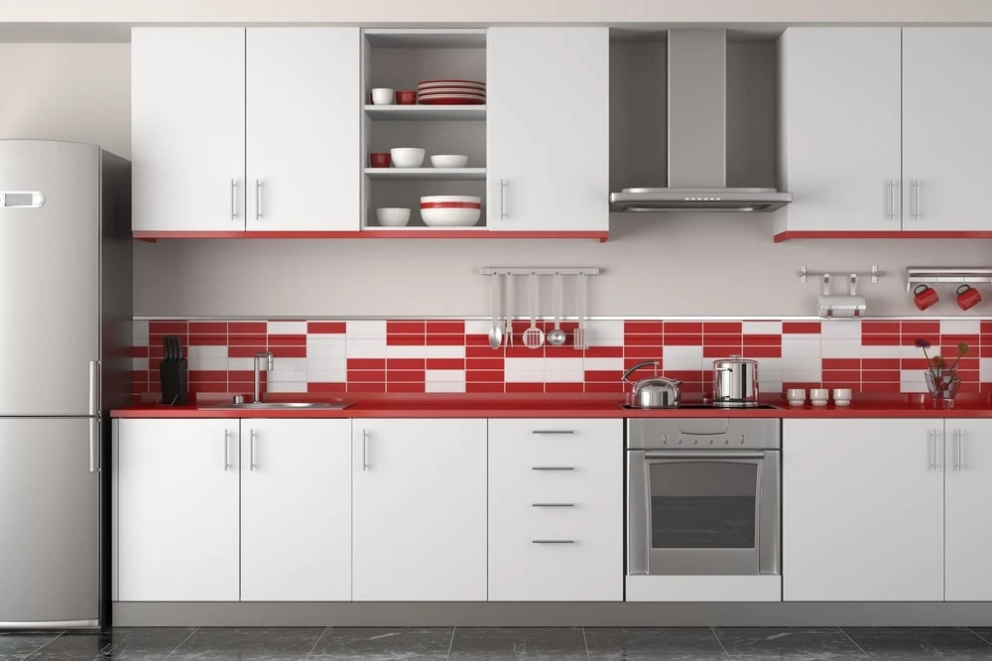
Your kitchen is the heart of your home, and your cabinets play a vital role in defining its look and feel. Choosing the right cabinets is important, but so is ensuring they match well with other elements in your kitchen. Here are six tips on how to match cabinets for a cohesive and stylish design.
- Matching cabinet doors
The most obvious step to undertake when planning to match cabinets is to match cabinet doors. Matching cabinet door styles is a crucial step in achieving a cohesive kitchen design. How to match existing kitchen cabinets starts with its most visible design feature: the cupboard doors.
How to match kitchen cabinet doors? Choose one style of cabinet door for all your cabinets to match cabinet doors and create a consistent look. Shaker-style doors are a popular choice for their clean, classic lines that work well with any kitchen style. You can also choose raised panel or flat panel doors, depending on your preference.
Another consideration for matching kitchen cabinet doors is the colour and finish of your cabinet doors. Stick to one colour and finish for a cohesive look. White cabinets with a matte finish are timeless and work well in any kitchen style. Alternatively, choose a wood grain finish to add warmth and texture to your kitchen.
- Mixing cabinet hardware finishes
Shaking up your kitchen style with mix and match cabinet hardware is like adding a dash of spice to your favourite recipe - adding excitement and interest. But just like a recipe, it's important not to go overboard. Limit yourself to two finishes at most when mixing cabinet hardware to avoid a hardware overload.
When mixing different size cabinet pulls and matching cabinet pulls and knobs, think about complementary pairings. If you have sleek stainless steel appliances, try pairing them with brushed nickel or polished chrome hardware for a harmonious blend. Or, if you have warm, natural wood cabinets, consider a brass or bronze hardware finish to add a pop of contrast.
Remember, the key to mixing hardware finishes is balance. Too much contrast can be overwhelming, but just the right amount can create a unique and stylish look that perfectly reflects your personal style.
- Matching countertops to cabinets
Matching a countertop to cabinets is a great way to create a cohesive look in your kitchen. Choose a countertop material that complements your cabinet’s finish. How to match countertops with cabinets? Here’s an example: white cabinets with black marble or quartz countertops look great, while grey cabinets pair well with butcher block or granite.
Countertops that match oak cabinets can make a kitchen look and feel warm. Use neutral painted or grained slab countertops to match oak cabinets. The key is to ensure that the colours and textures of your cabinets and countertops work together harmoniously. This can help create a sense of unity and balance in your kitchen, making it feel more welcoming and comfortable.
Another question we encounter is: should countertops match the floor or cabinets? The answer depends on your preferences and how you would like your kitchen to look like. A countertop and floor are in one parallel, so it looks good when they complement each other, but your cabinetry design may work well with the worktop without floor matching. So take the time to consider all the options and choose a countertop that complements your cabinets perfectly.
- Appliance and cabinet matching
In a kitchen, appliances that match cabinets are like the stars of a show. They are the main attractions that can make or break the overall look and feel of your space. That's why it's important to consider appliance and cabinet matching when designing your kitchen's interior.
One key consideration is colour. Choosing appliances that match cabinets in colour can help create a cohesive and harmonious look. For example, stainless steel appliances pair well with white or light-coloured cabinets, while black appliances can be paired with darker cabinets to create a bold contrast. Fridge matching cabinets is a common practice done by designers because refrigerators are basically the biggest appliance in the kitchen. How to make your fridge match your cabinets? You can opt for a neutral-coloured fridge or customize its design by repainting it.
- Cabinets and wall matching
Wall colour matching kitchen cabinets is like choosing the perfect outfit for a special occasion. You want them to work together in harmony, creating a cohesive and stylish look that reflects your personal taste.
One way to achieve this is by choosing complementary colours. Should white cabinets match white walls? If you have white cabinets, consider painting your walls a light and airy shade to create a sense of openness and spaciousness. Alternatively, if you have dark wood cabinets, lighter walls can provide a striking contrast and help create a warm and inviting atmosphere.
Another approach is to consider texture. If you have smooth and sleek cabinets, consider pairing them with textured walls, such as brick or stone, to create a dynamic and visually interesting look. On the other hand, if you have melamine cabinets with texture or detailing, smooth walls can provide a subtle and elegant background that lets your cabinets take center stage.
You can also choose paint colours to match oak cabinets. Paint colours to match brown cabinets are usually complementary ones or those that have a neutral shade. These colours can make your cabinets pop up. Paint colours to match wood cabinets include white, beige, grey, and other neutral shades.
- Matching cabinets and flooring
Should cabinets match the floor? Yes. The floor of the kitchen is like the basic backdrop of your interior. Therefore, it is important that your floor should match the rest of your kitchen’s décor. One important aspect to consider is colour. Choosing flooring that complements the colour of your cabinets can help create a cohesive and balanced look. For example, when looking for flooring to match honey oak cabinets, consider flooring with a warm, honey-tone finish to create a welcoming and cozy atmosphere. Anything that is wood can be used as flooring to match oak cabinets. On the other hand, if you have darker cabinets, lighter flooring can provide a striking contrast and help create a spacious and airy feel.
Another consideration is texture. If you have smooth and sleek cabinets, consider pairing them with flooring that has a lot of texture, such as hardwood or tile, to create a dynamic and visually interesting look. Alternatively, if you are looking for kitchen flooring to match maple cabinets, provide a subtle and elegant backdrop that allows your cabinets to shine.
It's also important to consider the style of your cabinets and flooring. If you have modern cabinets, consider flooring to match grey kitchen cabinets with clean lines and a contemporary design to create a cohesive look. On the other hand, if you have traditional cabinets, flooring with classic detailing can complement and enhance the overall aesthetic.
Complement or exact match?
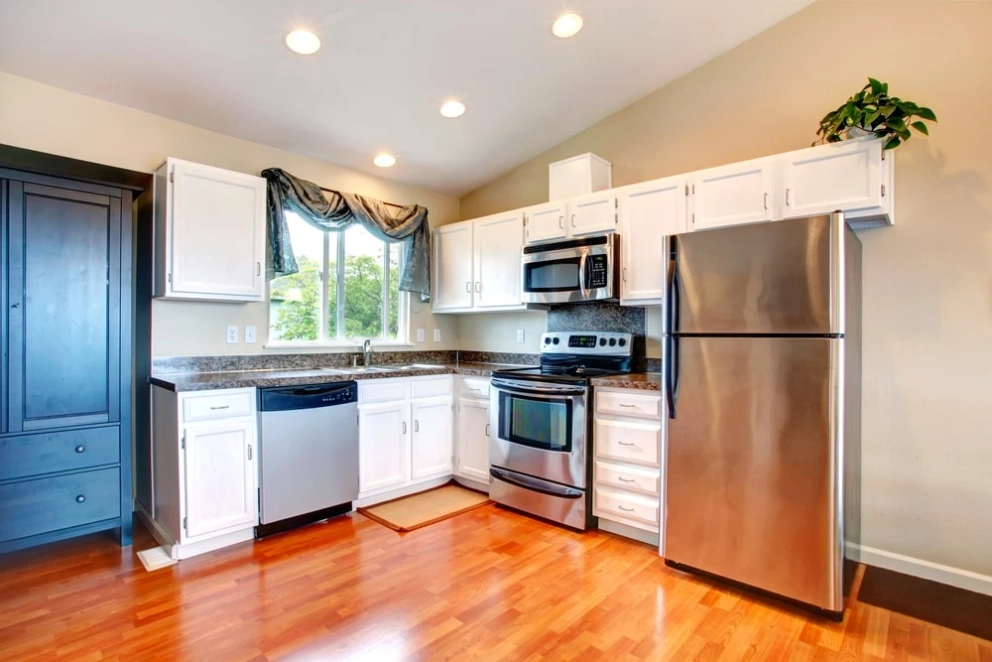
When it comes to designing your kitchen, one of the biggest decisions you'll make is choosing your cabinets. While it used to be standard to have all of your cabinets match exactly, modern design trends have opened up the possibility of mixing and matching different styles to create a unique and personalized look. But can you mix and match kitchen cabinets? And if so, how do you make it work?
The answer is yes, you can mix and match your kitchen cabinets. In fact, mixed cabinets in the kitchen can add depth and interest to your kitchen design, creating a more dynamic and visually appealing space. One popular approach is to mix different cabinet styles, such as mixing slab and shaker cabinets. This can create a beautiful contrast between the sleek, modern look of the slab cabinets and the classic, traditional look of the shaker cabinets.
But how do you make it work without it looking chaotic or haphazard? The key is to find a unifying element that ties everything together. This could be a common colour or finish, such as using the same hardware or countertop material throughout the kitchen. Alternatively, you could create a focal point, such as a large island or statement backsplash, that ties all of the different cabinet styles together.
Another important consideration is balance. While mixing and matching cabinets can be a great way to add interest and depth to your kitchen, you don't want to go overboard. Stick to two or three different styles at most, and make sure they complement each other without overwhelming the space.
Ultimately, the decision to mix and match your kitchen cabinets comes down to personal preference and style. Whether you choose to go with a cohesive, exact match look or mix different styles, the key is to create a space that reflects your unique taste and personality. So, don't be afraid to experiment and have fun with your design choices.
Mixing cabinet colours
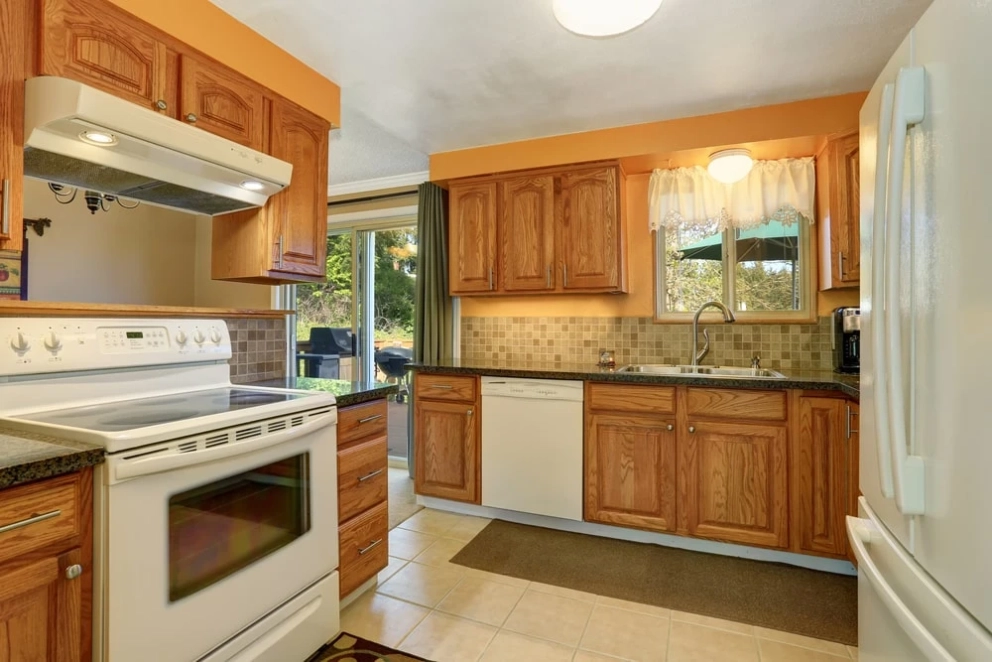
White and wood cabinets mixed is a classic and timeless look that works well in both modern and traditional kitchens. The key to achieving a cohesive look with these mixed-colour kitchen cabinets is to ensure that the wood cabinets complement the white cabinets' finish. For example, if you have white cabinets with a glossy finish, consider mixing kitchen cabinet colours and pairing them with light or natural wood cabinets with a matte finish.
Mixing oak and white cabinets can add warmth and character to a kitchen design, but they can also make a space look dated. To give your kitchen a modern update, consider mixing oak and white cabinets. This mix creates a beautiful contrast between the warm, natural look of oak and the clean, fresh look of white. Pairing oak cabinets with white upper cabinets can help to balance out the space and create a cohesive look.
Mixing kitchen cabinet door styles
Mixing cabinet styles can add personality and interest to your kitchen design. Mixing old and new kitchen cabinets is a design strategy designers have utilized to create personality and character in kitchen interiors. How to mix old kitchen cabinets with new ones? Here's a breakdown of some popular combinations:
| Cabinet Color | Door Style | Description |
| White | Glass-front | White cabinets with glass-front doors can create a clean, bright look with a touch of elegance. |
| Black | Shaker | Black cabinets with shaker doors can create a classic, timeless look that is both bold and inviting. |
| Gray | Slab | Can you mix the shaker and slab cabinets? Yes, you can! Gray cabinets with slab doors can create a modern, minimalist look with a touch of sophistication. |
| Blue | Beadboard | Blue cabinets with beadboard doors can create a charming, cottage-style look that is both cozy and inviting. |
| Green | Louvered | Green cabinets with louvered doors can create a coastal-inspired look that is both breezy and serene. |
| Wood | Raised Panel | Wood cabinets with raised panel doors can create a warm, traditional look that is both rustic and refined. |
Of course, these are just a few examples, such as mixing shaker and flat panel cabinets and countless other combinations you can try. When mixing cabinet colours and door styles, finding a balance that works for you is key. Stick to two or three styles at most, and make sure they complement each other without overwhelming the space.
